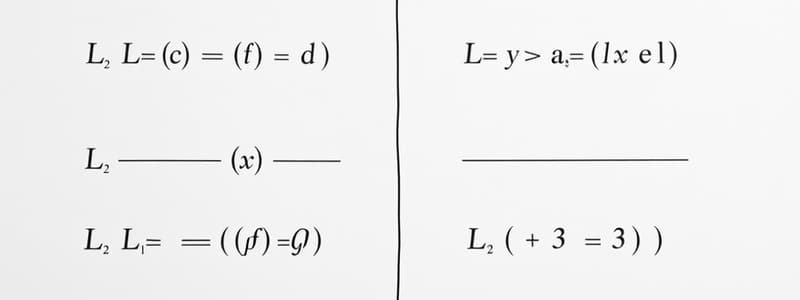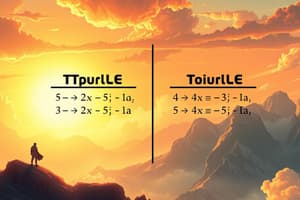Podcast
Questions and Answers
Match them
Match them
¬(¬p) = p (p∨q)∨r = p∨(q∨r) p∧(q∨r) = (p∧q)∨(p∧r) p→q = ¬p∨q
Match them
Match them
p↔q = (p∧q)∨(¬p∧¬q) ¬(p∧q) = ¬p∨¬q ¬(p∨q) = ¬p∧¬q p→q = ¬q→¬p
According to the Identity Laws, p∧True≡______
According to the Identity Laws, p∧True≡______
p
The Double Negation Law states that ¬(¬p)≡______.
The Double Negation Law states that ¬(¬p)≡______.
Signup and view all the answers
Study Notes
De Morgan's Laws
- Relate conjunctions and disjunctions via negation.
- Negation of a conjunction: ¬(P ∧ Q) equals (¬P ∨ ¬Q).
- Negation of a disjunction: ¬(P ∨ Q) equals (¬P ∧ ¬Q).
Contraposition
- A conditional statement and its contrapositive are logically equivalent.
- Example: P → Q is equivalent to ¬Q → ¬P.
Double Negation
- Negating a negation yields the original statement.
- Example: ¬(¬P) is equivalent to P.
Conditional Equivalence
- Conditional statements can be rewritten as disjunctions.
- Example: P → Q is equivalent to ¬P ∨ Q.
Distributive Laws
- Show how conjunctions and disjunctions can be distributed.
- Example: P ∧ (Q ∨ R) is equivalent to (P ∧ Q) ∨ (P ∧ R).
- Example: P ∨ (Q ∧ R) is equivalent to (P ∨ Q) ∧ (P ∨ R).
Identity Laws
- Identity for Conjunction: ( p \land \text{True} \equiv p )
- Identity for Disjunction: ( p \lor \text{False} \equiv p )
Domination Laws
- Dominance of True: ( p \lor \text{True} \equiv \text{True} )
- Dominance of False: ( p \land \text{False} \equiv \text{False} )
Idempotent Laws
- Idempotency for Disjunction: ( p \lor p \equiv p )
- Idempotency for Conjunction: ( p \land p \equiv p )
Double Negation Law
- Negation Simplification: ( \neg(\neg p) \equiv p )
Commutative Laws
- Commutative Property for Disjunction: ( p \lor q \equiv q \lor p )
- Commutative Property for Conjunction: ( p \land q \equiv q \land p )
Associative Laws
- Associative Property for Disjunction: ( (p \lor q) \lor r \equiv p \lor (q \lor r) )
- Associative Property for Conjunction: ( (p \land q) \land r \equiv p \land (q \land r) )
Distributive Laws
- Distributive for Conjunction over Disjunction: ( p \land (q \lor r) \equiv (p \land q) \lor (p \land r) )
- Distributive for Disjunction over Conjunction: ( p \lor (q \land r) \equiv (p \lor q) \land (p \lor r) )
Absorption Laws
- Absorption for Disjunction: ( p \lor (p \land q) \equiv p )
- Absorption for Conjunction: ( p \land (p \lor q) \equiv p )
Negation Laws
- Negation for Disjunction: ( p \lor \neg p \equiv \text{True} )
- Negation for Conjunction: ( p \land \neg p \equiv \text{False} )
Implication Law (Conditional Equivalence)
- Implication Representation: ( p \to q \equiv \neg p \lor q )
Biconditional Law
- Biconditional Representation: ( p \leftrightarrow q \equiv (p \land q) \lor (\neg p \land \neg q) )
- Truth Value: True when both ( p ) and ( q ) share the same truth value.
De Morgan’s Laws
- Negating Conjunction: ( \neg(p \land q) \equiv \neg p \lor \neg q )
- Negating Disjunction: ( \neg(p \lor q) \equiv \neg p \land \neg q )
Contrapositive Law
- Equivalent Implications: ( p \to q \equiv \neg q \to \neg p )
Distributive Property of Implication
- Implication with Disjunction: ( p \to (q \lor r) \equiv (p \to q) \lor (p \to r) )
- Implication with Conjunction: ( p \to (q \land r) \equiv (p \to q) \land (p \to r) )
Studying That Suits You
Use AI to generate personalized quizzes and flashcards to suit your learning preferences.
Description
Test your knowledge on the logical equivalence rules and De Morgan's laws. This quiz covers key concepts such as identity, domination, idempotent laws, and double negation. Challenge yourself to reinforce your understanding of these fundamental principles in logic.




